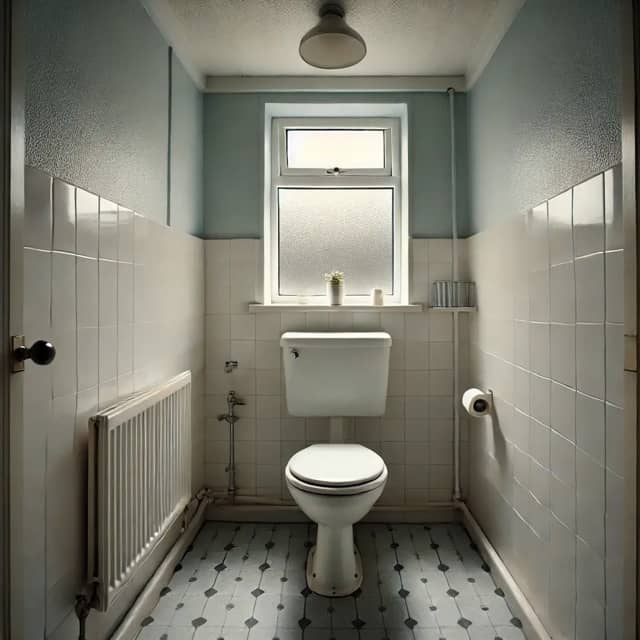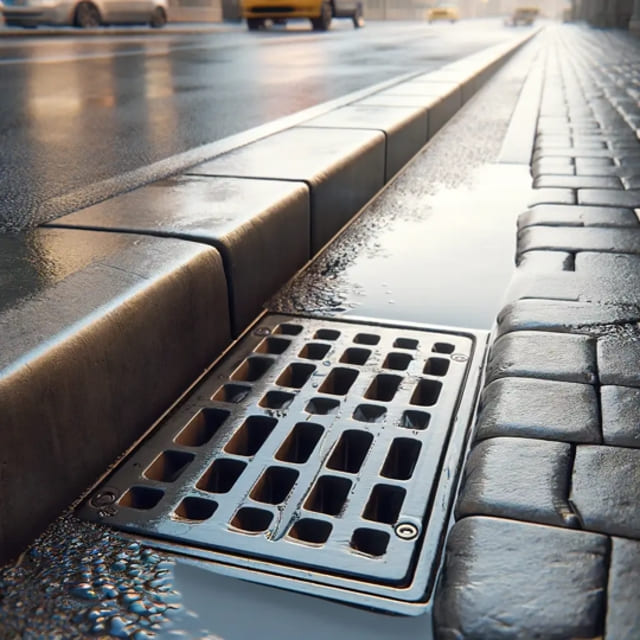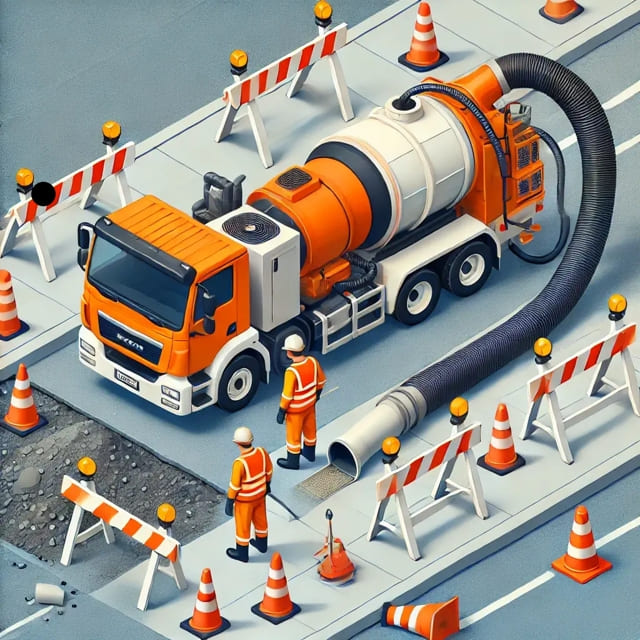Blocked drains can quickly turn from a minor inconvenience into a major headache. This is especially true when the weather turns bad.
See our main drain unblocking page here.
Typical Reasons for Blocked Drains in Sturton Grange
Drainage systems in Sturton Grange, face multiple types of blockages that are common elsewhere such as nearby Stourton, often caused by everyday activities. The following are the usual suspects:
Fat and Grease Accumulation
Kitchen drain blockages are often caused by fat, oil, and grease. When poured down the sink, these substances solidify as they cool, eventually building up and restricting water flow.
Over time, this can lead to complete blockages, causing water to back up. This often occurs in takeaways around Sturton Grange.
Soap Scum and Hair Buildup
Hair mixed with soap scum frequently clogs bathroom sinks and showers. Over time, this buildup restricts water flow, causing slow or standing water.
Objects That Shouldn’t Be Flushed
Objects such as wipes, sanitary items, and small toys can block pipes. These objects do not dissolve like toilet paper, resulting in large blockages.
Outdoor Debris and Roots
Roots seeking water and seasonal debris often block outdoor drains in Sturton Grange. This can lead to serious blockages in the main drainage system, especially during periods of heavy rainfall.

Signs You Need Drain Unblocking
Experiencing these symptoms means you may need a drain unblocking service in Sturton Grange:
Water Drains Slowly
If water is slow to drain from your sinks or showers, a blockage may be forming.
Bad Smells
Odours from your drains can signal a blockage due to decomposing waste or trapped debris.
Bubbling Sounds
Air trapped by a blockage often causes gurgling or bubbling noises in drains.
Stagnant Water and Overflowing Drains
Overflowing drains or standing water usually indicate a major blockage.
Local Drain Unblocking Services in Sturton Grange
Professional assistance is the most effective approach for clearing blocked drains. Consulting a professional is wise if the council hasn’t resolved the issue.
Powerful Water Jetting
High-pressure water jetting effectively clears blockages from drains.
It uses fast-flowing water to dislodge blockages from grease, debris, or roots. It’s a thorough and eco-friendly method that doesn’t use chemicals.
Drain Augers and Snakes
Drain snakes or augers are suitable for smaller, more localised blockages.
This is a flexible, mechanical tool that can reach into pipes and physically break up clogs caused by hair, soap, or foreign objects.
Drain Surveys Using CCTV
CCTV drain inspections are used when blockages are hard to detect.
A camera is used to find the blockage and check the pipe condition.
Fixing Blocked Drains
Blockages sometimes stem from serious issues like broken pipes. Fixing these issues keeps your drainage functioning for years.

Sturton Grange: A Rural Gem with Unique Drainage Needs
Sturton Grange, a picturesque civil parish in the City of Leeds, West Yorkshire, is known for its agricultural charm and historical landmarks. With a population of just over 400 (according to the 2011 Census), the area combines rural tranquility with a rich industrial heritage.
However, its agricultural focus and historical infrastructure bring unique challenges, particularly regarding drainage.
A Snapshot of Sturton Grange’s History
Situated near Garforth, Sturton Grange boasts a strategic location with the M1 motorway cutting through its northern edge and the Leeds to Selby railway line traversing the south.
This connectivity has long supported its primary industry—soft fruit cultivation, particularly strawberries.
Historical landmarks in the area include two Grade II listed structures: Brady Farm Bridge, an 1832 railway bridge constructed by the Leeds and Selby Railway, and a mid-19th-century milestone on Aberford Road.
These sites remind us of Sturton Grange’s importance during Yorkshire’s industrial boom.
The Importance of Drainage in Sturton Grange
Effective drainage is critical to Sturton Grange’s agriculture and infrastructure. Given the area’s reliance on farming, waterlogging caused by blocked drains can severely impact crop yields.
Additionally, the proximity of historical structures to drainage systems means that improper maintenance could threaten these heritage sites.
Local residents and landowners are encouraged to:
- Monitor drains regularly: Look out for blockages caused by debris, soil, or plant matter.
- Avoid drainage misuse: Refrain from disposing of inappropriate materials like oils, grease, or non-biodegradable items.
- Contact local resources: Leeds City Council or Yorkshire Water (yorkshirewater.com) can provide guidance on resolving major drainage concerns.
Preserving Sturton Grange
Maintaining drainage systems isn’t just about practical benefits—it’s about preserving the character of Sturton Grange.
Proper water management supports both the area’s agricultural vitality and its historic integrity. Residents and visitors alike can appreciate this balance of productivity and preservation.
Whether you’re a landowner managing farmland or a homeowner in the area, addressing drainage issues promptly helps sustain the natural beauty and functionality of Sturton Grange.
For guidance, consider resources like Leeds City Council and local drainage experts.

Who Is Responsible for Unblocking Your Drain in Sturton Grange: Tenant, Landlord, or Local Council?
In Sturton Grange, Leeds, the responsibility for unblocking drains depends on where the blockage occurs and what caused it.
Understanding the division of responsibilities between tenants, landlords, and local authorities can help ensure timely resolution of drainage issues.
Tenant Responsibility
Tenants in Sturton Grange are generally responsible for unblocking drains if the issue is caused by misuse or negligence. Common examples include:
- Flushing inappropriate items such as sanitary products, wet wipes, or grease.
- Allowing hair or debris to accumulate in sinks and showers.
It’s advisable for tenants to take preventive measures, such as using drain strainers and avoiding flushing non-degradable items.
Tenants are also typically expected to manage minor clogs, like those caused by soap scum or food particles.
Landlord Responsibility
Landlords are responsible for maintaining the property’s drainage system and addressing major structural issues, such as:
- Collapsed or broken pipes.
- Long-term blockages caused by tree roots or aging infrastructure.
- Ensuring the drainage system is in proper working order at the start of a tenancy.
If a blockage occurs due to wear and tear or faulty installation, it is typically the landlord’s responsibility to resolve the issue.
Local Council Responsibility
Blockages beyond the property boundary, such as those affecting public drains or sewers, may fall under the jurisdiction of Leeds City Council or other local authorities. These entities are generally responsible for:
- Maintaining public sewers and drainage systems in roads or shared spaces.
- Addressing blockages in main sewers that affect multiple properties.
For public sewer-related issues in Sturton Grange, tenants and landlords can report the problem to Yorkshire Water (yorkshirewater.com), which manages public drainage systems in the Leeds area.
Clarifying Drainage Responsibilities
For specific situations, it’s important to:
- Check the tenancy agreement: This document may outline who is responsible for specific drainage issues.
- Contact Leeds City Council or Yorkshire Water: They can confirm whether a blockage is within their scope of responsibility.
- Take prompt action: Early intervention can prevent further damage or inconvenience.
In a rural parish like Sturton Grange, where agricultural and residential systems coexist, maintaining effective drainage is essential.
Proper management ensures both the functionality of local infrastructure and the preservation of this historic community.

